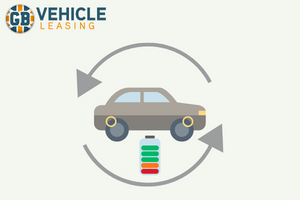
What is regenerative braking?
Welcome to our blog on regenerative braking! In the world of automotive engineering, regenerative braking has been a game-changer. This technology helps to conserve energy by capturing the kinetic energy that is typically lost when braking and transforming it into electrical energy that can be utilised to power the vehicle's electrical systems or saved in the battery for future use.
In this blog, GB Vehicle Leasing delve into the mechanics of regenerative braking and explore its benefits and drawbacks. So, whether you are a car enthusiast or just curious to know how regenerative braking works, keep reading to learn more.
How does regenerative braking work?
Electric and hybrid vehicles (including plug-in hybrids) utilise regenerative braking technology to recover the kinetic energy that is typically dissipated during braking and convert it into electrical energy. In traditional combustion engine vehicles, the kinetic energy produced during braking is lost as heat and becomes useless. However, with regenerative braking, the electric motor serves as a generator, converting the kinetic energy into electrical energy and sending it back to the battery. This stored energy can then be utilised to power the vehicle's electrical systems or enhance the torque applied to the wheels.
In most vehicles equipped with regenerative braking, the activation process is smooth. Applying the brake pedal with your foot initiates a collaboration between the regenerative and friction brakes, leading to the deceleration of the vehicle. Some cars with a particularly forceful system may utilise regenerative braking even when the car is coasting.
Often in hybrid and electric vehicles, you cannot turn off regenerative braking completely, as it is an integral part of the vehicle's braking system. However, some vehicles may allow you to adjust the level of regenerative braking or disable it temporarily through a specific driving mode or by using paddle shifters or other controls. It is important to check the specific features of your hybrid or electric vehicle to determine whether it allows you to adjust or temporarily disable regenerative braking.

What are the benefits of regenerative braking?
Regenerative braking technology offers several benefits, including:
Energy efficiency: Regenerative braking can recapture up to 70% of the energy lost during braking and use it to power the vehicle. This can improve the energy efficiency of the vehicle and increase its overall range.
Reduced emissions: By reducing the amount of energy wasted during braking, regenerative braking can help to reduce the emissions generated by the vehicle.
Improved performance: Regenerative braking can also improve the performance of the vehicle by reducing the wear and tear on traditional braking systems and reducing the need for frequent brake pad replacement.
Reduced noise: Regenerative braking can help to reduce the noise generated by the vehicle, making for a quieter and more pleasant driving experience.
Cost savings: By reducing the amount of energy wasted during braking, regenerative braking can help to lower the cost of operating the vehicle over its lifetime.
What are the drawbacks of regenerative braking?
While regenerative braking has many benefits, there are also some drawbacks to this technology:
Efficiency limitations: Regenerative braking works best when a vehicle is decelerating or braking, but its effectiveness is limited at low speeds, and it may not work at all at very high speeds. Therefore, the amount of energy that can be regenerated may not be significant in some driving conditions.
Battery limitations: The amount of energy that can be stored in the battery of a hybrid or electric vehicle is limited, and regenerative braking can only recapture a fraction of the energy used to accelerate the vehicle. This means that regenerative braking alone may not be sufficient to recharge the battery.
Mechanical complexity: Regenerative braking systems can be complex, requiring specialised hardware and software to operate effectively. This complexity can increase the cost of the vehicle and make it more difficult to maintain and repair.
Weight: Regenerative braking systems can add weight to a vehicle, which can reduce its overall efficiency and performance.
Safety concerns: Regenerative braking may not provide the same level of control and feel as traditional braking systems, which can be a concern for some drivers.
Do all hybrid vehicles have regenerative braking?
Most hybrid vehicles have regenerative braking as it is a key technology used to recapture energy and improve the efficiency of the vehicle. However, not all hybrid vehicles have regenerative braking as a standard feature, and some may have different types or levels of regenerative braking. Therefore, it is important to check the specific features of a hybrid vehicle to determine whether it has regenerative braking and how it operates.
Do all electric vehicles have regenerative braking?
Similarly, regenerative braking is a common feature in most electric vehicles (EVs). However, not all electric vehicles have regenerative braking as a standard feature, and the level of regenerative braking can vary among different models and manufacturers. Before selecting your new electric car, it’s worth checking the specific features.
To summarise, regenerative braking is a progressive technology that has the potential to enhance the efficiency, performance, and sustainability of electric and hybrid vehicles. Nevertheless, it is important to use regenerative braking responsibly, and to understand how it operates. With the increasing number of electric and hybrid vehicles on the roads, regenerative braking is expected to become an even more significant technology in the coming years.
If you liked reading this blog, click here for more of our latest news and reviews. In particular, check out our blog about driving in the dark - tips for staying safe. Also, follow us on Facebook or Twitter for more motoring updates.
About The Author: Charlotte Kennedy
Charlotte joined the GB Vehicle Leasing team around 6 years ago starting out as an apprentice and is now being a key member of our marketing team.
Find Out More About CharlotteLatest Posts

Volkswagen Taigo vs T-Roc: How Do They Compare
Here, we explore how they compare...

Skoda Elroq Review 2025
Buckle up, folks! This new Skoda...

Pre-Registered Vehicles Explained
Learn what a pre-registered vehicle is...

Hyundai Inster Review 2025
Move over, conventional cars! The Hyundai...

Vehicle Delivery Lead Times Explained
From custom factory orders to in...



































